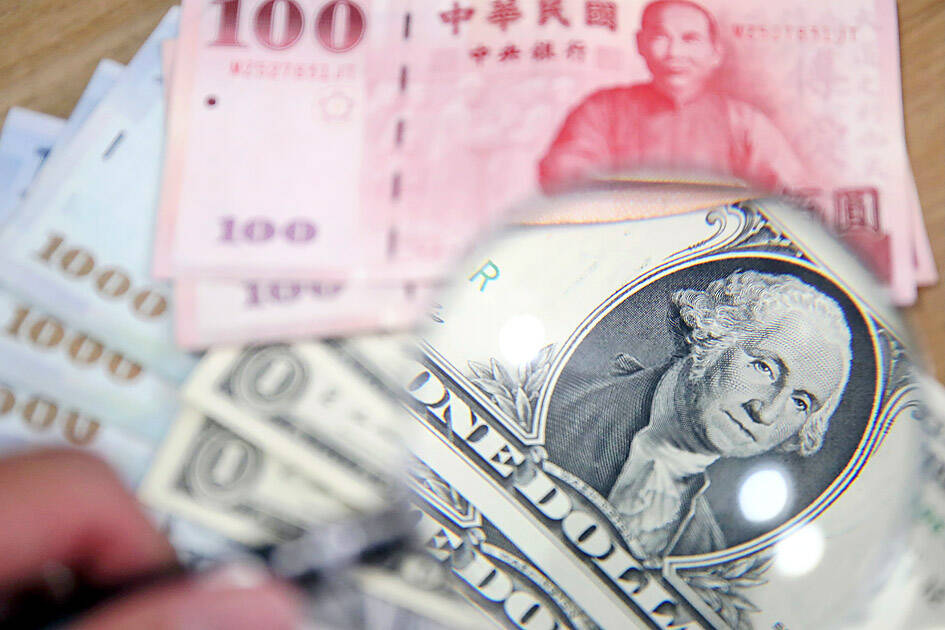The nation’s foreign exchange reserves last month posted their biggest decline in 12 years to an 18-month low of US$541.11 billion, as capital flight persisted and the central bank intervened to support the local currency, the central bank said yesterday.
“The decline in foreign exchange reserves came after major currencies weakened against the US dollar and the central bank sought to tame the local currency’s depreciation,” Department of Foreign Exchange Director-General Eugene Tsai (蔡炯民) told an online news conference.
The New Taiwan dollar last month shed 4.46 percent versus the greenback after the US Federal Reserve raised interest rates by 0.75 percentage points to rein in inflation.

Photo: CNA
Over the same period, the Australian dollar tumbled 5.74 percent, the British pound lost 5.1 percent and the yen softened 4.24 percent against the US dollar, Tsai said.
The central bank spent US$8.25 billion to support the NT dollar in the first six months of this year, with the volume expected to pick up in light of the local currency’s downward trajectory.
At the same time, drastic tightening by major central banks sent financial markets into wild swings, and the local bourse proved no exception, Tsai said.
Securities and saving deposits held by foreign portfolio managers stood at US$436.9 billion, equivalent to 81 percent of foreign exchange reserves — the lowest since July 2020, Tsai said.
The NT dollar fell the most in 25 years in the quarter ending on Sept. 30. It was the second-worst performance in Asia after the won, with global funds selling more than US$10 billion of Taiwanese stocks, Bloomberg data showed.
While the period saw Chinese threats toward Taiwan intensify, the outflows were mainly due to the US rate hikes, central bank Governor Yang Chin-long (楊金龍) said last month.
“Asian central banks might have to keep up their direct and indirect FX intervention to slow the depreciation of their currencies,” Bloomberg Intelligence said in a report this week.
Japan spent almost US$20 billion US dollars last month to prop up the yen. South Korea sold a net US$15.4 billion of US dollars in the three months through June.
If this month sees a fourth monthly decline in Taiwan’s foreign exchange reserves, that would be the longest fall since a four-month stretch in 2008, during the global financial crisis.
Additional reporting by Bloomberg

SELL-OFF: Investors expect tariff-driven volatility as the local boarse reopens today, while analysts say government support and solid fundamentals would steady sentiment Local investors are bracing for a sharp market downturn today as the nation’s financial markets resume trading following a two-day closure for national holidays before the weekend, with sentiment rattled by US President Donald Trump’s sweeping tariff announcement. Trump’s unveiling of new “reciprocal tariffs” on Wednesday triggered a sell-off in global markets, with the FTSE Taiwan Index Futures — a benchmark for Taiwanese equities traded in Singapore — tumbling 9.2 percent over the past two sessions. Meanwhile, the American depositary receipts (ADRs) of Taiwan Semiconductor Manufacturing Co (TSMC, 台積電), the most heavily weighted stock on the TAIEX, plunged 13.8 percent in

A wave of stop-loss selling and panic selling hit Taiwan's stock market at its opening today, with the weighted index plunging 2,086 points — a drop of more than 9.7 percent — marking the largest intraday point and percentage loss on record. The index bottomed out at 19,212.02, while futures were locked limit-down, with more than 1,000 stocks hitting their daily drop limit. Three heavyweight stocks — Taiwan Semiconductor Manufacturing Co (TSMC, 台積電), Hon Hai Precision Industry Co (Foxconn, 鴻海精密) and MediaTek (聯發科) — hit their limit-down prices as soon as the market opened, falling to NT$848 (US$25.54), NT$138.5 and NT$1,295 respectively. TSMC's

ASML Holding NV, the sole producer of the most advanced machines used in semiconductor manufacturing, said geopolitical tensions are harming innovation a day after US President Donald Trump levied massive tariffs that promise to disrupt trade flows across the entire world. “Our industry has been built basically on the ability of people to work together, to innovate together,” ASML chief executive officer Christophe Fouquet said in a recorded message at a Thursday industry event in the Netherlands. Export controls and increasing geopolitical tensions challenge that collaboration, he said, without specifically addressing the new US tariffs. Tech executives in the EU, which is

In a small town in Paraguay, a showdown is brewing between traditional producers of yerba mate, a bitter herbal tea popular across South America, and miners of a shinier treasure: gold. A rush for the precious metal is pitting mate growers and indigenous groups against the expanding operations of small-scale miners who, until recently, were their neighbors, not nemeses. “They [the miners] have destroyed everything... The canals, springs, swamps,” said Vidal Britez, president of the Yerba Mate Producers’ Association of the town of Paso Yobai, about 210km east of capital Asuncion. “You can see the pollution from the dead fish.